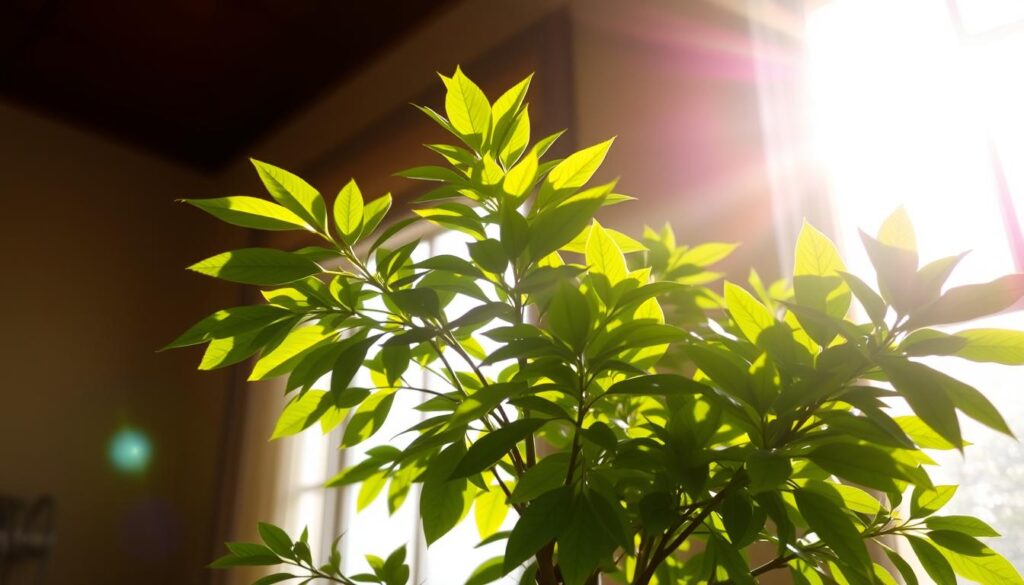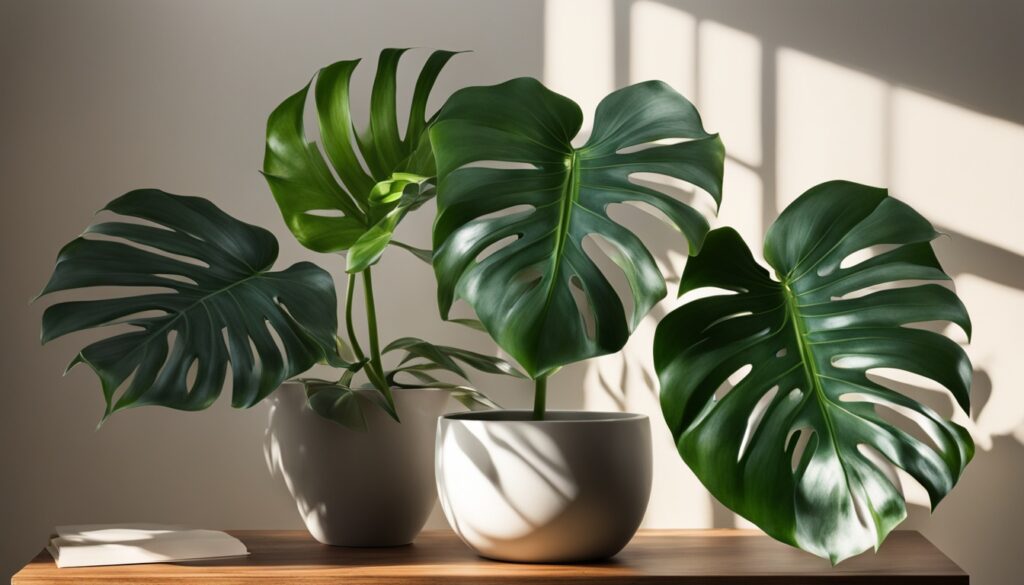Money trees (Pachira aquatica) are amazing houseplants. They can grow up to 24 inches a year and reach 6 to 8 feet tall. But, they don’t like dark places. They need at least six hours of bright to medium indirect sunlight every day.
With the right care, money trees can live over a decade. They are great for both indoor and outdoor gardens. Knowing their light needs helps keep them healthy and thriving for years.
Key Takeaways
- Money trees need at least 6 hours of bright to medium indirect sunlight daily for optimal growth.
- They prefer to be near east, west, or south-facing windows for the right light.
- Money trees can handle lower light, but might grow slower or have other problems.
- Proper watering, temperature, humidity, and fertilization are also key for a healthy money tree.
- With the right care, money trees can grow up to 24 inches a year and live for over a decade.
Understanding the Money Tree: Origins and Characteristics
The Pachira aquatica, known as the money tree, has a rich history and cultural importance. It comes from Central and South America’s swampy areas. This tree has won the hearts of many plant lovers around the world.
Native Habitat and Natural Growth Patterns
In their natural setting near rivers, money trees can grow up to 60 feet tall. But indoors, they usually stay between 6-8 feet. Their braided trunk and shiny leaves show their beauty and adaptability.
Physical Characteristics and Size Expectations
The money tree’s growth and looks are quite interesting. Outdoor trees can grow very tall, but indoor ones stay smaller. This makes them perfect for small spaces, as they can grow well in many places.
Cultural Significance and Symbolism
In Asian cultures, the money tree is seen as a symbol of luck and prosperity. It’s believed to bring good feng shui. The five leaves on each branch represent the five elements of feng shui. So, money trees are often given as gifts to attract wealth and success.
“Finding a Money Tree stalk with seven leaves is considered incredibly rare and brings immense luck.”
The money tree’s cultural value goes beyond just wealth. In some beliefs, finding a tree with seven leaves is very rare and brings great luck to the owner.
Does a Money Tree Need Sunlight: Essential Light Requirements
Knowing the right light for a money tree is key for its health and beauty. These plants don’t do well in dark places. They need bright, indirect sunlight to grow well.
Place your money tree by an east-, west-, or south-facing window. This way, it gets plenty of natural light all day. If you only have a north-facing window, the plant can handle some light, but it won’t grow as much.
Don’t put your money tree in direct sunlight. The strong rays can burn its leaves. If it’s too dark, use bright indirect sunlight plants like grow lights. Make sure your money tree gets 6-8 hours of light every day.
| Light Requirement | Optimal Placement |
|---|---|
| Bright, indirect sunlight | East, west, or south-facing window |
| Moderate light | North-facing window |
| Direct sunlight | Avoid, as it can damage the leaves |
Watch the money tree light requirements and move it if needed. This way, your money tree will get the best light for strong growth and a full, healthy look.
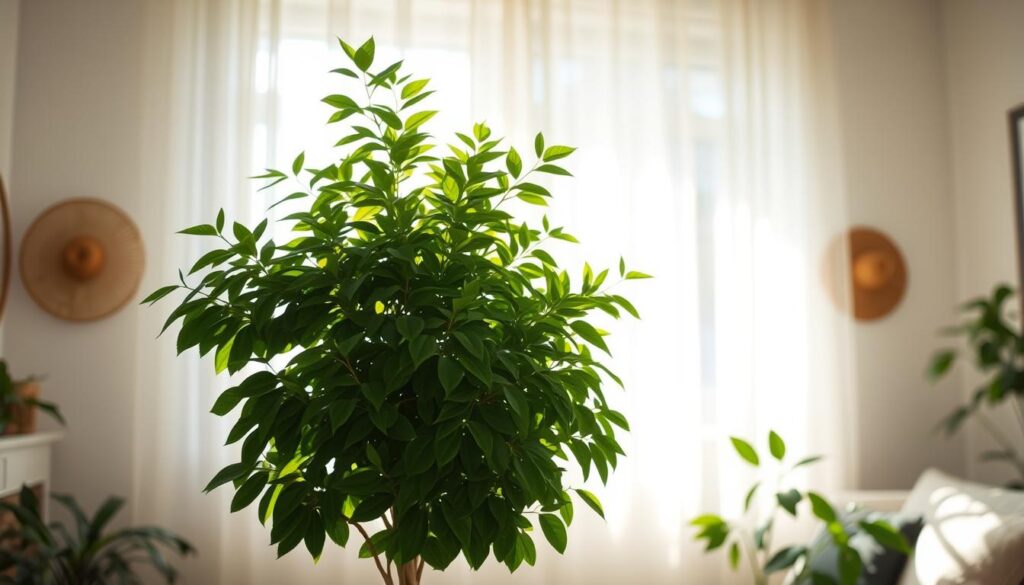
“Adequate light is crucial for money trees during flowering and fruiting stages to encourage optimal growth and production.”
Optimal Growing Conditions for Money Trees
To keep your money tree healthy and vibrant, it needs the right growing conditions. These plants do best in certain temperatures, humidity, and air flow. This helps them grow well indoors.
Temperature Requirements
Money trees like temperatures between 65°F and 85°F (18°C to 29°C). They can handle a bit cooler or warmer, but extreme temperatures can harm them. Keeping the temperature steady is key to your tree’s happiness.
Humidity Levels
Being from tropical places, money trees love high humidity. Try to keep the humidity around 50% to mimic their natural home. You can use a pebble tray with water, mist the leaves, or a small humidifier to help.
Air Circulation Needs
Money trees need good air flow. Make sure they get enough air, but not too much from vents or fans. Good air flow stops fungal problems and keeps the plant healthy. A small desktop fan can help circulate air.
By keeping the temperature, humidity, and air flow right, your money tree will thrive indoors. With proper care, these plants can brighten and beautify your space for a long time.
Selecting the Perfect Location for Your Money Tree
Choosing the right spot for your money tree is key to its health. These plants love bright, indirect light. They do best away from direct sunlight and cold drafts.
Place your money tree near an east or west-facing window. This spot offers gentle, filtered light, just like its natural home. Direct sunlight can cause leaves to droop or the trunk to get scorched.
If your place doesn’t get much natural light, grow lights can help. Rotate your money tree now and then. This ensures it gets light evenly and grows straight.
Keep your money tree away from strong sunlight. Use sheer curtains or blinds to soften the light. Also, change the plant’s spot with the seasons to keep the light right.
Don’t put your money tree near heating or cooling vents. Sudden temperature changes can harm it. Instead, find a spot with a steady temperature of 65-75℉. This makes it easy to water and care for the plant.

By picking the best spot for your money tree, you help it grow strong and healthy. This iconic plant will add beauty to your indoor space.
Soil Requirements and Potting Considerations
Choosing the right soil is key for your money tree’s health. These plants do well in a mix that drains well and is full of nutrients. A mix based on peat moss, with a pH of 6.0 to 7.5, is perfect for them.
Best Soil Composition
For the best growth, pick a soil that drains quickly. A mix for cacti or succulents works great. You can also add perlite or coarse sand to improve drainage and air.
Drainage Needs
Good drainage stops waterlogging and root rot. Use a pot with big holes at the bottom for excess water to go out. Don’t let the plant sit in water, as it can cause big problems.
“Maintaining the right balance of moisture and drainage is key to keeping a money tree healthy and thriving indoors.”
With the right well-draining potting mix and container, your money tree will thrive. It will add beauty to your home for many years.
Watering Schedule and Techniques
Proper watering is key for your money tree to stay healthy. You want to water it just right – not too much, not too little. Water when the top inch of soil feels dry. This usually happens every one to two weeks, depending on the environment.
When it’s time to water, make sure to soak the soil well. It should drain out of the pot’s holes. Don’t let the soil dry out completely, as it can stress the plant. But, too much water can cause root rot. Make sure the pot and soil mix drain well to avoid this.
In the fall and winter, your money tree grows slower. So, you’ll need to water it less often. Use water that’s room temperature to prevent shocking the plant.
To keep your money tree in top shape, follow these indoor plant watering tips:
- Water when the top inch of soil is dry to the touch, typically every one to two weeks.
- Thoroughly soak the soil until water runs out of the drainage holes.
- Reduce watering in the fall and winter when growth slows down.
- Use room-temperature water to avoid shocking the plant.
- Ensure proper drainage to prevent overwatering and root rot.
By following these tips, your money tree will stay happy and healthy. It will thrive and bring good fortune to your space.
| Watering Frequency | Soil Moisture Level | Water Temperature |
|---|---|---|
| Every 1-2 weeks | Top inch is dry | Room temperature |
| Less often in fall/winter | Avoid completely dry | Avoid cold water |
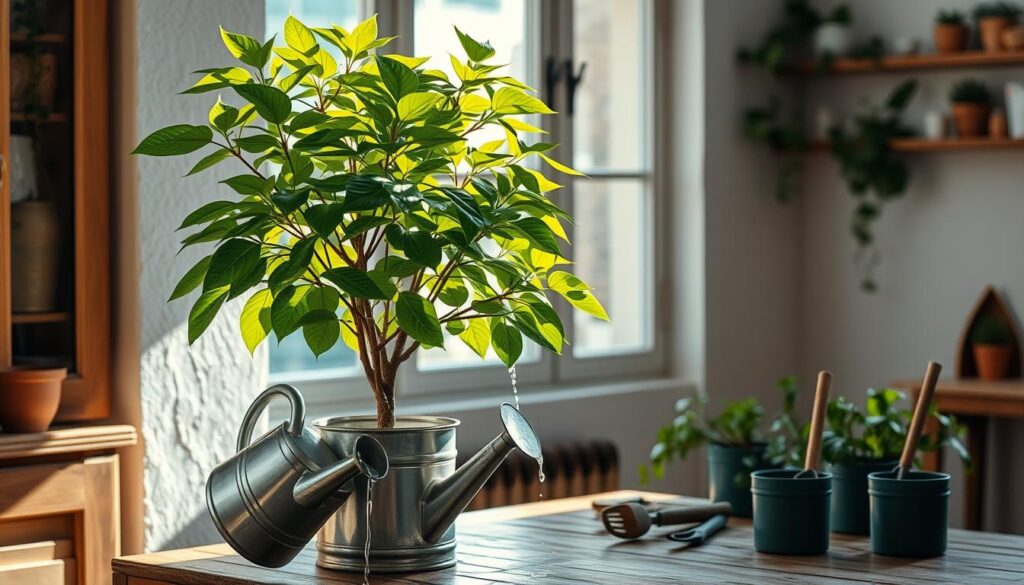
“Watering your money tree with care is the key to its long-term health and prosperity.”
Fertilization Guidelines for Healthy Growth
It’s important to give your money tree the right nutrients for it to grow well. Use a balanced, all-purpose indoor plant food every month during spring and summer.
Types of Fertilizer
Choose a money tree fertilizer or indoor plant food that’s diluted to half-strength. Organic and slow-release granules are good choices too. But, don’t overdo it, as too much fertilizer can harm your plant’s roots.
Seasonal Feeding Schedule
- Fertilize your money tree monthly in spring and summer.
- Feed it every two months in fall and winter when it grows slower.
- Water your plant well before and after fertilizing to avoid root damage.
By following these money tree fertilizer tips, your plant will get the nutrients it needs. This will help it stay healthy and look great indoors.
| Fertilizer Type | Feeding Frequency | Dilution |
|---|---|---|
| All-purpose Indoor Plant Fertilizer | Monthly (Spring/Summer), Bi-monthly (Fall/Winter) | Half-strength |
| Organic Fertilizer | Monthly (Spring/Summer), Bi-monthly (Fall/Winter) | As Directed |
| Slow-Release Granules | Every 2-3 Months | N/A |
“Proper feeding is essential for the long-term health and vigor of your money tree. Striking the right balance is key to avoiding potential issues like overfertilization.”
The Art of Braiding Money Tree Stems
The braided money tree is a symbol of prosperity and good luck. It’s not necessary for the plant’s health but is loved by many. To start braiding, the plant should be young and flexible.
You’ll need a money tree with at least three stems over 14 inches long. Begin braiding at the base or top. Keep the braid loose to allow growth. Use soft string or tape to keep it in shape.
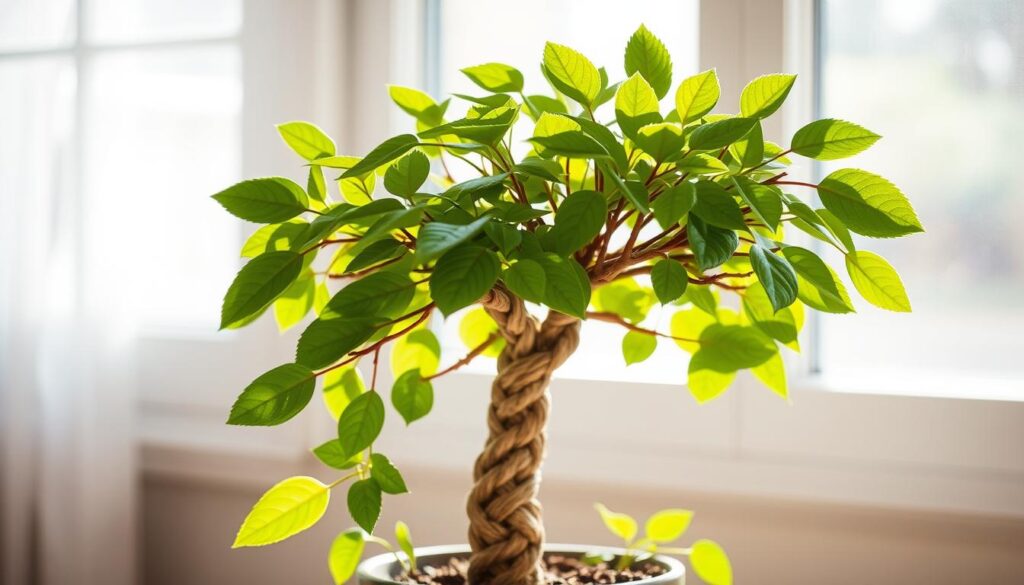
For older money trees, add new growth to keep the braid looking good. Braiding doesn’t harm the plant’s health. But, watch out as stems grow thicker to avoid damage.
Braiding money trees started in Taiwan in the 1980s. It’s a way to add beauty and luck to your space. With practice, you can create a stunning braided money tree.
Pruning and Maintenance Tips
Keeping your money tree (Pachira aquatica) healthy and looking good is key. Regular pruning and the right care help it grow well. Learn the best ways to prune and care for your money.
When to Prune Your Money Tree
Spring is the best time to prune your money tree. It’s when the plant is growing the most. This is when you can cut out dead or damaged branches and shape the plant. Pruning in winter can harm the plant and slow its growth.
Proper Pruning Techniques
Use sharp pruning shears to make clean cuts on your money tree. Keep the plant’s natural shape and remove unwanted growth. For a bonsai look, trim the top leaves when you reach the desired height. Don’t prune too much, as it can harm the plant’s health.
Proper money tree pruning and indoor plant maintenance are crucial. They help your Pachira aquatica thrive and look great. Follow these tips to keep your money tree beautiful and healthy at home or in the office.
“Regular pruning and maintenance can help your money tree reach its full potential and bring a touch of good luck to your space.”
Common Growth Problems and Solutions
Money trees (Pachira aquatica) are known for their strength and resilience. Yet, they can still face growth challenges. Knowing the common issues and how to fix them is key to keeping your money tree healthy and thriving.
Yellowing or browning leaves are often a sign of too much water or not enough light. Check your watering schedule and make sure the plant gets enough indirect sunlight.
Soft, mushy stems or trunk usually mean the plant is getting too much water. This can lead to root rot. Cut back on watering and consider repotting in soil that drains well.
Pests like spider mites can also be a problem. If you spot them, isolate the plant and treat it with neem oil to get rid of them.
- Yellowing or browning leaves often signal overwatering or light issues
- Soft, mushy stems or trunk suggest overwatering and potential root rot
- Spider mite infestations can be addressed with neem oil treatment
Spotting and fixing these common issues quickly is crucial for your money tree’s health. Adjusting how you water, light, and manage pests will help your plant stay vibrant and healthy.
| Problem | Symptoms | Solution |
|---|---|---|
| Overwatering | Yellowing leaves, soft stems, foul soil odor | Reduce watering, consider repotting in fresh, well-draining soil |
| Underwatering | Crispy, brown leaves, dry soil | Water more frequently, ensure proper soil moisture |
| Pests (Spider mites) | Small insects, webbing, sticky leaves | Isolate plant, treat with neem oil |
| Nutrient Deficiency | Yellow, stunted leaves | Apply balanced fertilizer according to schedule |
By tackling these common money tree problems, you can help your plant flourish. This way, it will continue to bring good fortune to your home.
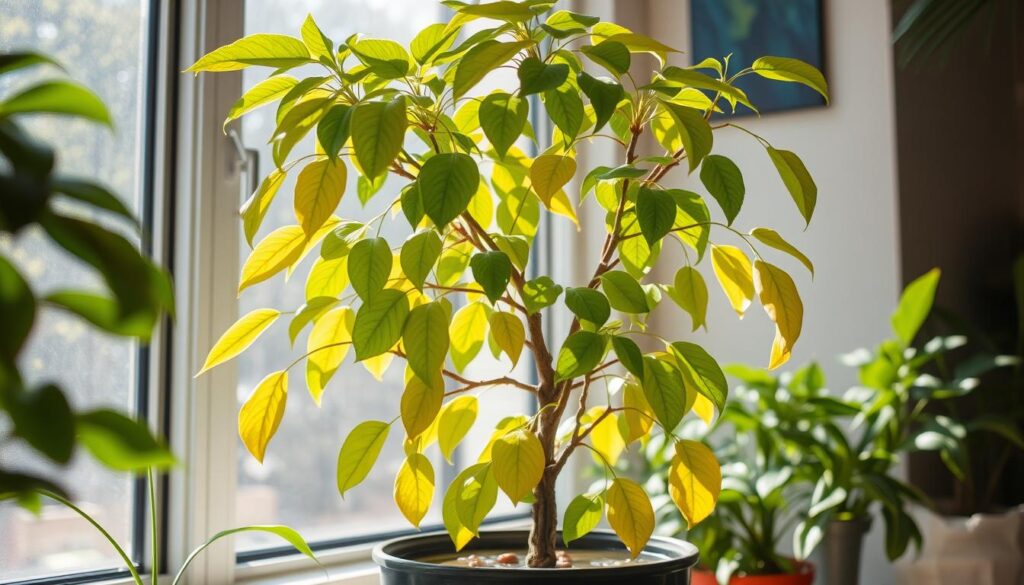
Propagation Methods for Money Trees
It’s easy to bring the beauty of the money tree into your home or garden. There are many ways to do this. These tips will help you grow new plants from your existing one.
Stem cuttings are a popular and simple method. In spring or summer, cut a 4-6 inch stem from a healthy part of the plant. Make sure it has a couple of nodes. Then, remove the lower leaves and put the cutting in water or moist soil. Roots will grow in a few weeks, and you can then plant it in a pot.
Air layering is a fun and engaging way to propagate, especially for bigger plants. This method makes roots grow on a stem while it’s still attached. By making a small cut and wrapping the stem in moist moss, you can grow new roots. These can then be cut and planted as a new plant.
Remember, you can’t propagate from a patented cultivar without permission. But with patience and the right conditions, you can grow more money trees. This way, you can share these beautiful, easy-to-care-for plants with others.
| Propagation Method | Key Considerations | Timeframe |
|---|---|---|
| Stem Cuttings | – Take 4-6 inch cuttings with nodes – Remove lower leaves – Use water or moist potting mix |
2-3 weeks for root development |
| Air Layering | – Induce root growth on attached stem – Wrap stem in moist sphagnum moss – Sever rooted section when established |
Varies depending on plant maturity |
Propagating money trees from cuttings is a widely used and effective method known as the “bread and butter” of plant propagation techniques.
Signs of a Healthy Money Tree Plant
To keep your money tree healthy, watch for certain signs. A good money tree has green, shiny leaves that feel firm. New leaves should grow often when it’s growing. The trunk should be strong, not soft or mushy.
Leaf Color and Texture
Healthy money tree leaves are deep green and without spots or discoloration. They should look smooth and glossy, feeling firm and leathery.
Growth Rate Indicators
- Look for steady, consistent growth, as money trees are capable of growing up to 24 inches per year in ideal conditions.
- The plant should maintain its shape without becoming leggy or sparse.
By watching these plant growth indicators, you can make sure your money tree is doing well. It will live up to its reputation as a healthy money tree.
“With proper care, money trees can live for over a decade.”
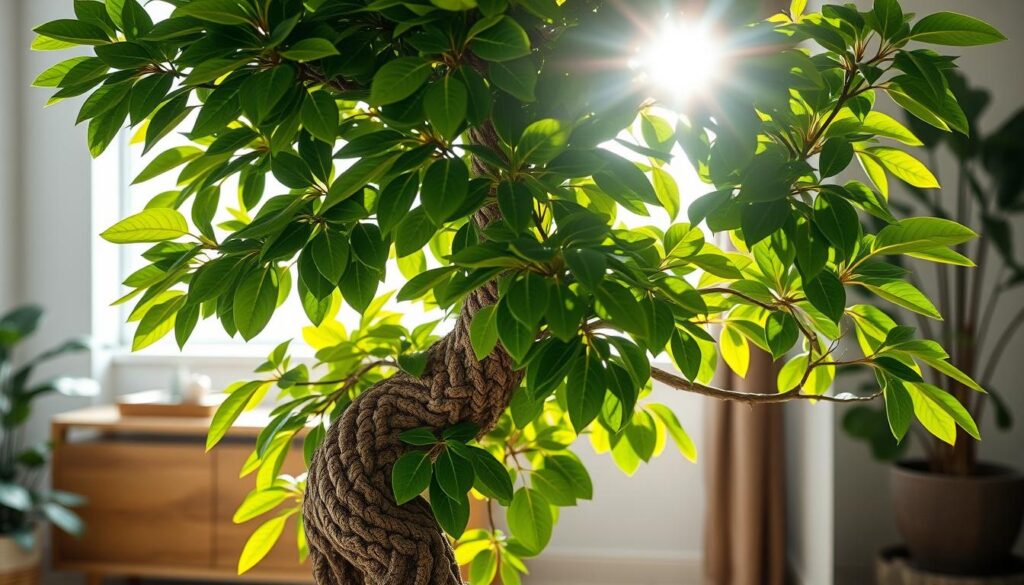
Seasonal Care Adjustments
Caring for a money tree means changing your routine with the seasons. In spring and summer, water and fertilize more often because the plant grows fast. In fall and winter, water and fertilize less because it grows slower. Keeping the temperature steady all year is key for the plant’s health.
Here are important care tips for your money tree:
- Increase watering and fertilizing in spring and summer for growth.
- Water and fertilize less in fall and winter as growth slows.
- Keep temperatures between 65°F and 75°F (18°C to 24°C) all year.
- Use a humidifier or pebble tray to increase humidity in dry winter months.
- Gradually move the plant outdoors in summer and bring it back inside before it gets cold.
By watching your money tree’s needs and adjusting your care, it will stay healthy and green. A bit of seasonal tweaking can help your money tree thrive. Remember, proper care leads to a beautiful indoor plant winter care and money tree seasonal care.
https://www.youtube.com/watch?v=emCAXs1c68c
“Caring for a money tree is a year-round commitment, but the rewards of its lush foliage and symbolic significance make it well worth the effort.”
Repotting Guidelines and Timeline
To keep your Money Tree healthy, you need to repot it every 2-3 years. This is especially true when the plant’s roots start to fill the pot. Repotting lets the roots get fresh soil, which helps your plant grow strong and healthy.
The best time to repot your Money Tree is in the spring. This is when it’s most active and can easily bounce back from transplanting. Don’t repot in winter, as the plant is dormant then. Pick a pot that’s 1-2 inches bigger than the current one. This gives the roots room to grow.
Before you start, get everything you need. This includes a good potting mix with peat moss, perlite, and bark. These ingredients help your Money Tree grow well. With the right soil and a big enough pot, your Money Tree will stay healthy and beautiful for years.
